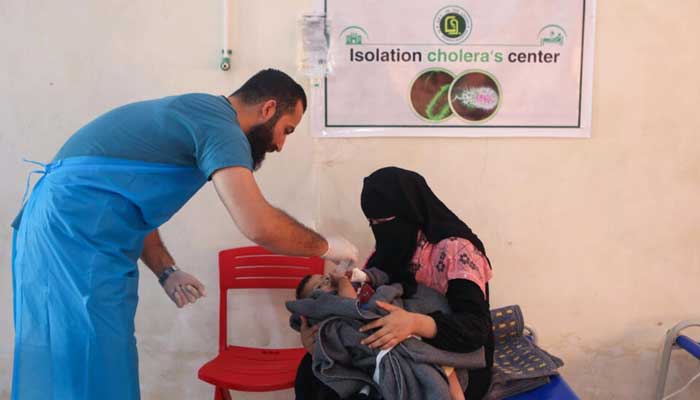[ad_1]
BEIRUT: Human Rights Watch on Monday accused the government in Damascus and Turkey of exacerbating a deadly cholera outbreak in Syria by restricting the flow of aid and water into the country’s Kurdish-controlled northeast.
Syria has recorded 81 deaths and more than 24,000 suspected cases of the severe disease since September, according to the World Health Organization, in the country’s first outbreak in more than a decade.
Human Rights Watch said Ankara had “failed to ensure” an adequate flow of water through the Euphrates River and the supply from the strategic Alouk water station, which is controlled by Turkey.
The rights group also criticized the government of Syrian President Bashar al-Assad for the “discriminatory diversion of aid and basic services” away from Kurdish-controlled areas in the northeast of the country.
Residents of this region are facing reduced river flow from the Euphrates, as a water test in September confirmed the presence of bacteria responsible for cholera, a Kurdish health official told reporters at the time.
Neighbor and archenemy Turkey has also been accused by the Syrian Kurdish authorities of weaponizing the waters by choking off the river’s course – allegations denied by Ankara.
“Turkey can, and should, immediately stop exacerbating the water crisis in Syria,” said Adam Coogle, deputy Middle East director at Human Rights Watch.
“A devastating cholera outbreak will not be the last water-borne disease to affect Syrians if the country’s severe water problems are not addressed immediately.”
Cholera is generally transmitted from contaminated food or water and is spread in residential areas that lack proper sanitation or piped drinking water.
“Long-term restrictions on aid access to Kurdish-controlled areas…have left healthcare facilities and humanitarian groups operating in northeastern Syria scrambling to respond to a disease that could spread quickly,” Human Rights Watch said, detailing the Syrian government’s alleged responsibility. .
Inside Syria, the Euphrates flows mostly along territory controlled by the semi-autonomous Kurdish authorities, whose US-backed fighters drove the Islamic State (IS) last scrap of jihadists from Syrian territory in 2019.
Turkey considers these Kurdish fighters terrorists.
Human Rights Watch said: “All parties to the conflict must ensure the right to clean water and health for all in Syria.”
[ad_2]
Source link

